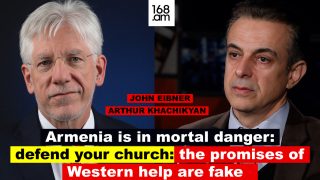New Parliament: Struggle of mind titans or of ‘tribals’?

The list of political parties and their alliances participating in upcoming parliamentary elections have already been submitted. Armenia has entered the pre-election stage. What will the new Parliament be like? Which powers have more potential to appear in the National Assembly? Participants of the “Pressing” Club held on Tuesday were Vigen Hakobyan, political strategist, Armen Martiroysan, Vice President of the Heritage Party, candidate for the MP at Ohanyan-Raffi-Oskanian alliance, Samvel Farmanyan, Republican Party of Armenia (RPA) MP, Mher Shahgeldyan, member and candidate for the MP at “Armenian Renaissance” political party (former “Rule of Law”), and David Matevosyan, member and candidate for the MP at “Armenian National Congress (ANC)—People’s Party of Armenia (PPA)” alliance. The debate was conducted by Satik Seyranyan, editor-in-chief of “168 Hours” newspaper.
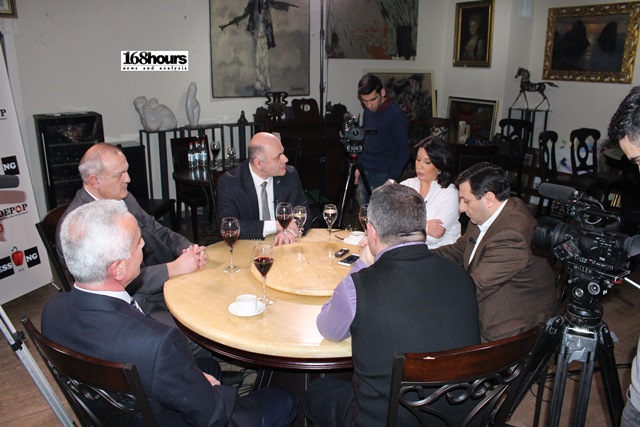
Satik Seyranyan: In these elections, basically, the ideology was moved to the second plan, and we observed alliances for the sake of goal. Why did the ideology become secondary and to which extent will it have an effect over the activity of those powers?
Vigen Hakobyan: I consider, politics is almost business logic: demand and supply proportion should be maintained. It turned out, that in the period of recent decades, however, voters don’t put forward big claims of ideological provisions from political powers. The latters, realizing it, spread their activity on other values. And secondly, I think, from a certain phase many political powers, realizing, assessing their own resources, i.e. lack of those resources (institutional, structural, personnel and financial), started to realize that it’s better attempt to consolidate those resources, establish a single structure and attempt to achieve something through joint resources. However, it’s a rather serious process, and in a period of one-two months, as the experience showed, and it should be such, it comes across with serious obstacles. Even there were political parties, which stated that they are an alliance, and collapsed halfway, as among Armenian reality one of the major issues is the phase, when places should be distributed.
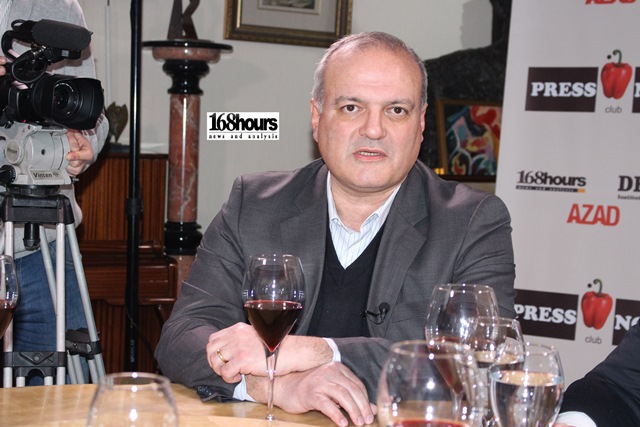
And we saw that many political powers and alliances simply didn’t stand the test. In this case primary issue of many political parties wasn’t ideological commonness, but entering the Parliament, after which it isn’t at all important what will happen then. History also shows that almost the following day, or 1-2 months later, the alliances are collapsing. We saw in ANC that although they participated by one list, it wasn’t an alliance, however, by its content, by its type it was an alliance. Currently we observe almost the same among “Free Democrats”. I don’t want to say that there is no shared ideology there, however, likewise formats are full of threats, as I agree, almost there is no shared ideology. We observe more or less shared ideology among “Yelk” alliance, at least regarding the vector of preferences.
Satik Seyranyan: However, in this regard there is discordance among “Civil Contract” (at least on leaders’ level) and “Bright Armenia” or “Republic” party.
Vigen Hakobyan: That’s why I said more or less, however, even in their signed document there is a clear decision on external political vector, i.e. the European direction. It isn’t an ideal variant either, only for comparison I say there is something in it.
Satik Seyranyan: Mr. Martirosyan, former “Heritage” MPs, for instance, Zaruhi Postanjyan, accuse the party that it refused its declared principles and you have changed the direction by joining Oskanian-Ohanyan alliance. Why did it happen? Why was the ideology moved to the second plan?
Armen Martirosyan: Indeed, the society doesn’t have that need for ideology, as the society has a real view. I realize, that at the moment there is no any ideology in Armenia and can’t work, as there is no election mechanism, there is no independent financing, system of governance is built not on ideological principle, e.g. they are socialists or liberals, or conservatives, lefts or rights, or nationalists, or just the contrary—internationalists, but exclusively around a principle, and it’s called legal and illegal (mostly illegal) appropriation of public, natural resources.
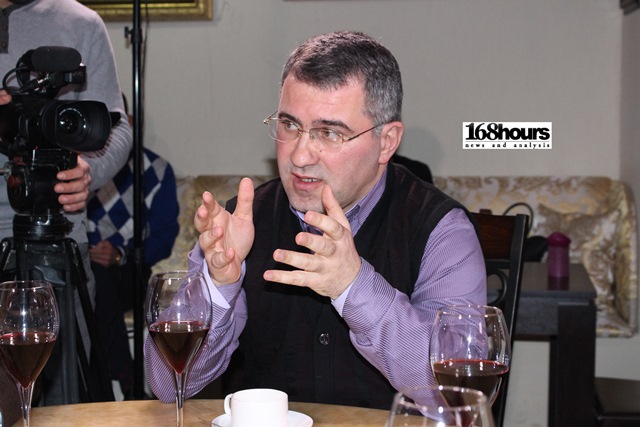
And the society only sets forward a demand that the resource was distributed among the public, i.e. a situation changed, in case of which those resources will be available. Also it’s obvious that in any case the current political system basically lacks. We have a leading political party, where, of course, there are political figures, however, in its overwhelming majority it’s only centralization of the administrative resource. If there will be no Republican party tomorrow, I’m sure it’ll be even in worse condition from the Armenian National Movement (ANM), in which it appeared in 1998.
Satik Seyranyan: If we speak of ANM, then “Heritage” didn’t pass that test either as a result of two elections.
Armen Martirosyan: “Heritage” stood, that’s the point. Ten years are left. The well-known figures you mentioned have left. Not mass escape was recorded, just the contrary, the stone, on the basis of which “Heritage” was shaped, that stone exists.
Satik Seyranyan: Who is the stone? Raffi Hovhannisyan? You?
Armen Martirosyan: Not only. I’m not the one, I joined in the second phase. Do you know Gevorg Kalenchyan?
Satik Seyranyan: No.
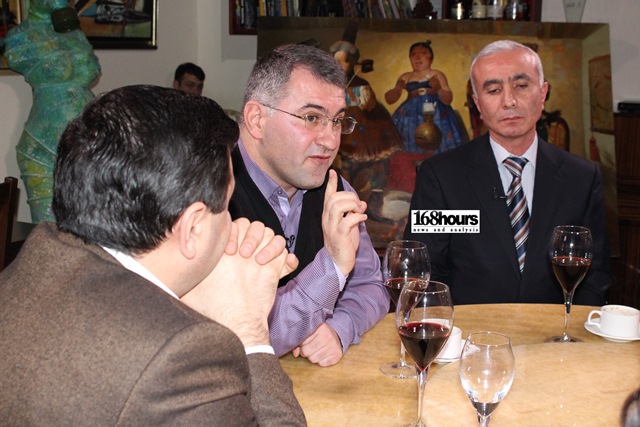
Armen Martirosyan: You don’t know, but he is one of the pillars.
Satik Seyranyan: It turns out, he is the stone.
Armen Martirosyan: Not only. There are others as well from territorial organizations.
Satik Seyranyan: Well, in this case who should develop social demand?
Armen Martirosyan: The society realizes that in the system of governance, basically, the issue isn’t that the political parties don’t provide certain ideologies, but that a political system as such lacks, also there is no Constitutional order. As upon the Constitution, our country is a legal, social state, isn’t it? What legality may be touched upon, when there are political prisoners, when there is 34% poverty, when there is hyper-centralization of property illegally? The citizens realize this, don’t they?
Or what freedom of political activity we may touch upon, when an attempt is made to enervate opposition political parties both by seduction and pressure? And how can we touch upon freedom of speech, when a person is made to become a member of the leading party or any other. By my example, by others’ example I know this. Our citizen realizes this and says: just restore my legal rights, try to do something consolidated, only after that you may bring forward the directions—left, right, liberal, and within it I’ll say which one is more appropriate to me. Thus, I totally agree supply-demand principal functions here.
Satik Seyranyan: The society used to submit its demand to the leader of your political party—Raffi Hovhannisyan at presidential elections.
Armen Martirosyan: Yes, they gave their votes.
Satik Seyranyan: Why was it wasted?
Armen Martirosyan: No, they weren’t.
Satik Seyranyan: The society went to the street, provided such support, what happened?
Armen Martirosyan: I’ve answered to this question a thousand times, but it isn’t difficult for me to answer once again. It wasn’t wasted, as there was the wall of the leadership, in case of which victims could have been recorded, and support in form of participation…As Serzh Sargsyan himself told Raffi Hovhannisyan—show 30 thousand people and I’ll talk to you. Unfortunately 30 thousand people didn’t gather. Thus, Serzh Sargsyan talked not to Raffi Hovhannisyan, but brought forward a police wall. There was no need for senseless bloodshed.
Satik Seyranyan: Mr. Matevosyan, ANC is a power, which not only participated in Electoral Code debates but took part in changes through 4+4+4 format, submitted its proposals. ANC representatives state that this Electoral Code, in amended form, provides wider opportunities. Let’s speak of those opportunities. Don’t the political figures develop that ideological demand among the society?
David Matevosyan: Firstly, let me reflect to Armen Martirosyan’s speech about ANM, successor of which is ANC. It’s an ideological political power, which until now is loyal to the program it developed at the moment of its foundation, and takes part in these elections out of purposes of implementing that program with the slogan “Peace, Conciliation, Good Neighborliness”. And if some things happened conditioned by slight shifts, it’s only an implication of persecutions by the authorities, from the fact of Vano Siradeghyan’s being an exile up to March 1 murders, persecutions, political prisoners, numerous cases of depriving of income. After all that power exists with the leadership of Levon Ter-Petrosyan, and again together with PPA, loyal to the ideology, has set forward its most important claim—develop social demand for the sake of establishing peace. And he considers that issue currently is number one of the people of Armenia, the state, as well as Karabakh. As for our participation in Electoral Code adoption, here not only the ANC, but also others have been engaged, which is welcomed, however, unfortunately, the whole Electoral Code didn’t pass through that filter.
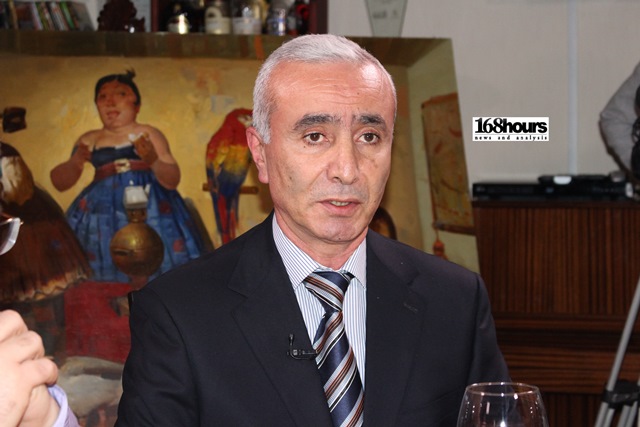
As a result of consolidation and with the support of international community, a slight move was recorded, and one of the main tools of election fraud has been eliminated—not provide the opportunity to vote instead of numerous voters, absent from the country. To be more figurative, let me state, that formerly participation in elections in Armenia didn’t exceed 1 million 200 thousand, in the period of Robert Kocharyan and Serzh Sargsyan that index reached 1 million 800 thousand. Difference of those figures is both voting instead of the absentees, and policy of leading non-interested persons to elections through bribe. However, the law is rather dangerous to the sense that, basically any political power, let me bring the example of the authorities, e.g. is divided into two armies: the first part is party’s face, façade, and there are emissaries managing the streets, in the bottom of the list.
Satik Seyranyan: The “street” has always existed, since the 90s.
David Matevosyan: Of course, the “street” has always existed, however, currently there are calculators on people regarding how many votes he/she might bring, sum of which will become votes for the party, and this is the most dangerous. If the law had a construction that from the first number everybody was being nominated by proportional list, this would be quite a different thing: in fact, political competition would be observed. However, when incomprehensible people should fight for bringing votes and others become MPs, in this Parliament we would have half less button pushers, as in any case political figures will appear in the parliament, however, the other part will also complete through non-political vote-providing figures, to whom they should compensate.
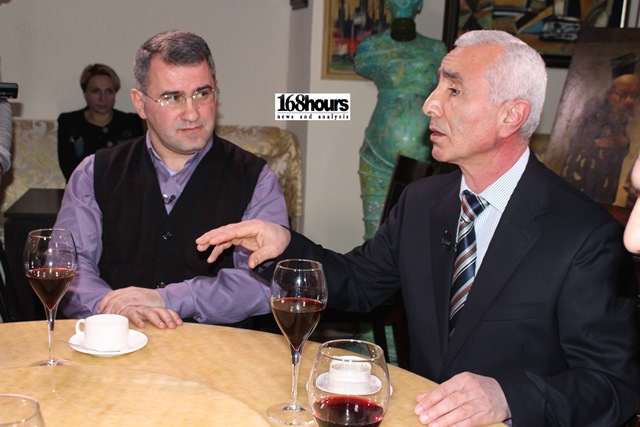
There is a serious technical gap: there is such an Armenian trick, which is called a “carrousel” and currently that trick is simply statutory, i.e. the voter enters the polling booth by taking 9 ballots, casts the vote to any political party, and the other 8 puts in the pocket and goes out. Those unused ballots are being filled in sacks and don’t participate in calculation. Currently this issue is in the field of Central Electoral Commission (CEC), as by law description of the polling booth is rather brief and provides the opportunity that the authorities, represented by CEC can actively find solution, create an opportunity that all activities forced to the voter were visible.
Armen Martirosyan: But it isn’t absolutely mandatory, it isn’t enshrined in the law, that the voter should throw those ballots and can’t take them with him/her. Boxes will be installed, however, the voter may both throw and keep them.
Samvel Farmanyan: It’s an improper concern, if the leading political party exerts pressure over the citizen and says: you should vote not for ANC, but RPA, he/she will take other ballots, and will leave, i.e. it’s an improper concern.
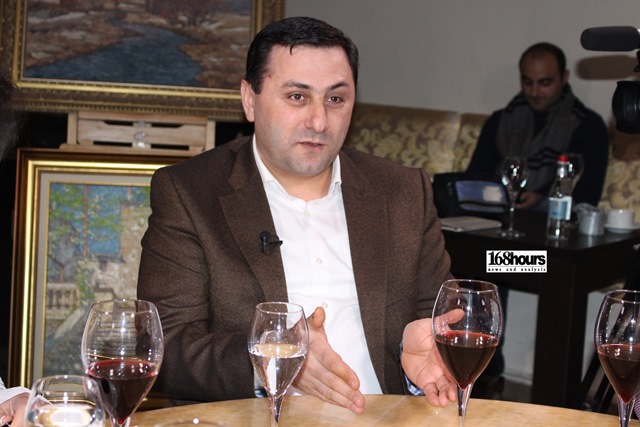
Armen Martirosyan: Mr. Farmanyan, he/she should show that he/she has all the ballots besides that of RPA. You also know there will be an open part on the envelope’s corner and it’ll be seen whether it has a ballot inside or not. The ballot should be mandatorily inserted as it’ll also have a holographic sign.
David Matevosyan: How elections are being technologically held? They are initially agreed, a whole army is taking part in organizational work, means of transportation are being attached, whole services. I was present in the polling station in all elections and from my experience I state, as the army comes to elections in the morning, people are brought the same way. Simply there won’t be a ballot in the ballot box to take and do what you said. It’s impossible.
Satik Seyranyan: Mr. Shahgeldyan, why was ideology moved to the second plan, as during the “Rule of Law” both your leader and political party have been accused of withdrawal from your promises, and you cooperated with the authorities. Doesn’t this disappoint the society? You have votes, however, you started cooperation with the authority, you made a coalition, then out of certain reasons you left…Isn’t this the reason that the society is being disappointed from political powers and doesn’t have expectancies?
Mher Shahgeldyan: You gave the question, which contained your view. First and foremost, what we said, we fought to implement it, and many things have been done to this or that extent, as much as our votes were sufficient for. Currently return of deposits is being touched upon, or the authorities state on compensation: when we were a coalition with the authorities, we fought, decision on compensation has been adopted, more than USD 40 million has been compensated, and currently we’ll continue fighting for that. On account of the demographic condition we have repeatedly stated on aid to the third or fourth child. They said: it’s populism, it’s impossible, then the decision was adopted. It’s another thing, that currently, unfortunately, numerous cases with violation of law are being recorded, when half of the people pay, other payments are being postponed, however, the decision was adopted.
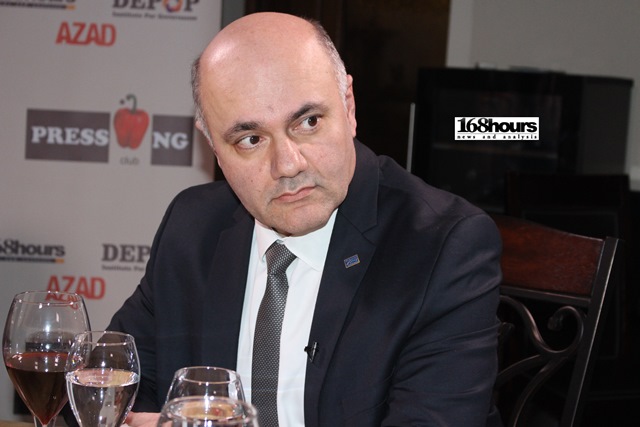
Many families today receive money for the fourth, fifth, sixth child. It’s our deep belief that this somewhat mitigates the shameful demographic condition available today. If it didn’t, everything would be much worse. For a lasting period we fought against privatizing kindergartens, then it became possible to suspend. There are such numerous principles and approaches, which became a reality. Being inside the coalition, we succeeded to nominate, introduce and fight against programs, for which they cast a vote. And when you realize it’s no more possible to work with 5-6 MPs amid 60, naturally, you withdraw from the coalition.
What you say we haven’t done, we said and we did with all possibilities. There are numerous programs, points, which became a reality now, and people, yes, are making use of these programs. Or passing on to free system from the paid one based on marks: it was also our proposal, which thanks Goodness, was applied, and many children can study now. On the second issue you mentioned: do you also consider that the political power should generally be opposition only? I consider there is no such an issue in any country.
Satik Seyranyan: The power led by Artur Baghdasaryan prior to elections, as a rule, is becoming an opposition, fights, makes rather tough statements addressed to the authorities, gains votes, and by being elected, closely cooperates with the authorities, assumes positions. Explain this from the voter’s position.
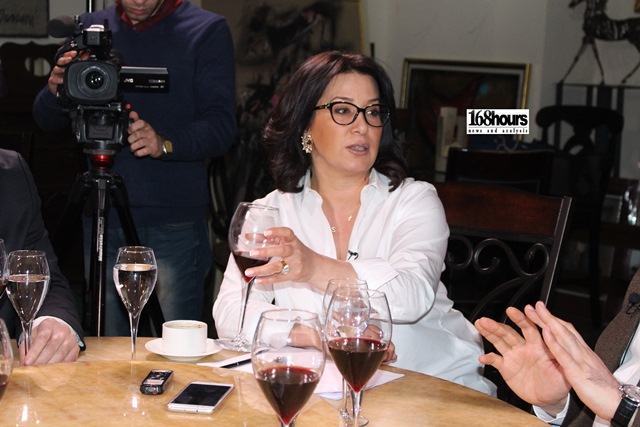
Mher Shahgeldyan: We have repeatedly touched upon it, there was serious external threat: what happened in other countries. I socialize with the citizens: if it were the way you say, first and foremost, “Rule of Law” and currently—“Armenian Renaissance” (ARP), wouldn’t regularly win in the elections, crossing the 5% barrier, and gaining more votes. During the recent elections of local self-government bodies (Vanadzor, Gyumri) the ARP increased both the number of heads of the community and members of the council of elders. The vote of trust we gained in the communities once again proves wider social positive position and attitude toward our political party. The rest will show these elections, as finally no matter there is election bribe, double voting in Armenia, there is expression of people’s will, which has its place, in which we trust.
As for possible issues during voting: in fact, there is a serious issue, which is in CEC field, and the idea of likewise “carousel” is constantly being circulated today. As it isn’t being settled: how non-voted ballots should be thrown? How should they be calculated? When should they be emptied?
There are serious issues, I don’t even speak of ID cards linked to the first stage, where only one fingerprint is found, where there are no addresses, the database isn’t common and etc. By the way, we were against this Code, as the only point linked to proportional system became a simple majoritarian system, as by proportional lists, basically votes are cast for individuals. And there are individuals, who have no connection to politics at all.
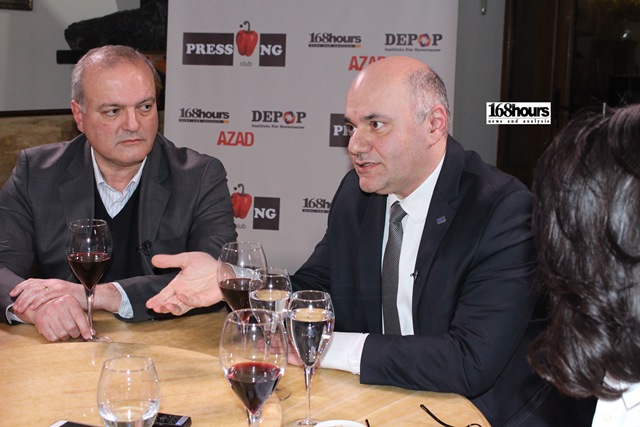
Satik Seyranyan: Mr. Farmanyan, according to the speakers, following the example of the authorities, the political system has been destroyed, for this very reason the citizen no more demands for an ideology from political powers.
Samvel Farmanyan: Of course, it would be from the genre of absurd to insist, that the political system is developed, and democratic institutes are developed like in mature democratic countries. However, in this issue, for the sake of justice, I should say that our positions compared with post-Soviet transformations, are rather good in that regard. Of course, political life in Armenia is rather diverted from classic genre rules, and God forbid, when my opposition partners mention this vice of our political system, probably, they mean academic truth that it also equally refers to the other wing of the political system: not only of the authorities, but also the opposition political field. If for a while we go beyond this roundtable, we’ll see that in the eyes of average statistical educated Armenian, when vices of political system are being touched upon, not only political leadership, but also political opposition is meant.
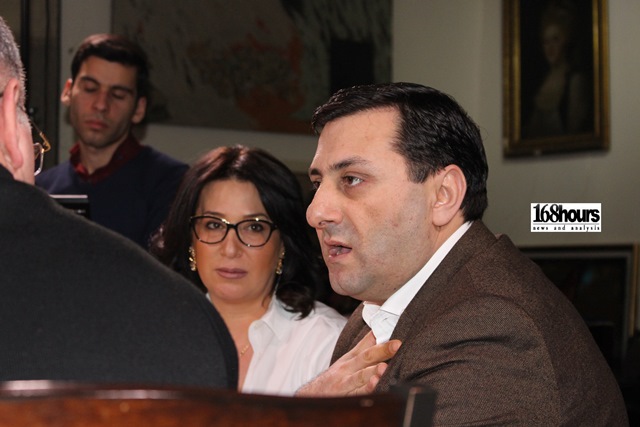
Accordingly, if our life is diverted from classical rules, anticipate that political parties generally will be led by conceptual ideological approaches, which maybe are available on textbook platform, regarding the way the political union, at least at the moment of foundation, observes solution of the issue our economy faces, how it builds system of values, this, basically, doesn’t function in Armenia and has its fundamental reasons. The simplest explanation will be directing the arrow of accusations to the political leadership: no, it isn’t so. As long as middle class hasn’t been developed in the country, as a result of electoral processes the authority hasn’t been passed on to other political powers, and main political opposition actors haven’t recognized election results, our political life will continue somewhat remaining in this permanent condition.
Regarding Parliamentary elections I consider they’ll have vital importance from our perspective of state-building not only for the reason that first elections will pass on the way to parliamentary governance system, and it’s rather joyful to record that as a result of rather constructive engagement with the opposition we have recorded visible changes of the Electoral Code, basically accepting all reasonable proposals. We all perfectly realize that these steps provide considerable, crucial preconditions to lead electoral processes in a more mature way. However, it should be supplemented by current leadership, in this case our political will, and I can assure, that all the concerns, that may be among different political opposition wings, that the political leadership, basically, adopting legislative changes or stating on the readiness of holding qualified elections, in fact, has thought over certain roundabout concept on how to steal votes, it doesn’t correspond to the reality.
I should also record with regret, that opposition vocabulary, rhetoric is also one of the conditions for not so big success, when in any issue, every time explanation and accusation may be addressed to the incumbent leadership. At a certain period this worked in our political life, however, at least for intellectual electorate such easy explanations don’t work. I’d like to see parliament with really big intellectual potential, despite engagement—multipolar parliament, where different political powers will exist.
Now about accusations addressed to the leadership. No matter what the electoral system will be like, practically it may bring both good and bad outcomes. It may be a 100% proportional order without preferential manifestation, it may be an absolute majoritarian electoral system. For the sake of justice we should record something different, that it should be equally bothering for all. It’s the following: Mr. Martirosyan, the political figures producing political mind and with political majority currently aren’t so demanded among our society. Why is it so? What I say, isn’t an accusation, but a concern, and refers to us all equally.
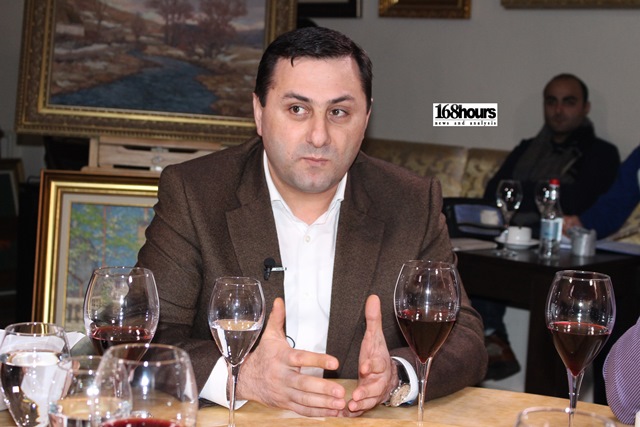
Can we bring arguments why it’s so? The reality is that probably all political actors, participating in electoral processes from the 1990s, have their own part of guilt. And the question of all questions is: what to do, that those with political mind and political unshakeable approaches or views, preferred, for instance, approaches of Levon Ter-Petrosyan—peace in NK and other issues, were more demanded among the society? The new Constitution will contribute to consolidation of political actors—political parties, movements, so that those processes were recorded as quick as possible, and there were developed big political actors in Armenia with their intellectual, financial, organizational resources.
I observe the role of leading political majority not only in striving to gain maximum votes, like each of you, but also provide qualified progress of processes, and from intellectual perspective—provide multipolar intellectual parliament.
David Matevosyan: As for your accusations [to Samvel Farmanyan—ed.] addressed to the opposition, to the sense, that the society doesn’t stand next to them, has a very serious explanation—March 1. As long as “March 1” isn’t uncovered in Armenia, the ordinary citizen considers dangerous supporting a political power with an opinion varying from those of the authorities. It’s simply destructive for it. I say with my own example: people, who are very respectful when meeting with me under the election veil, they don’t dare to greet in the society. This is the implication of March1.
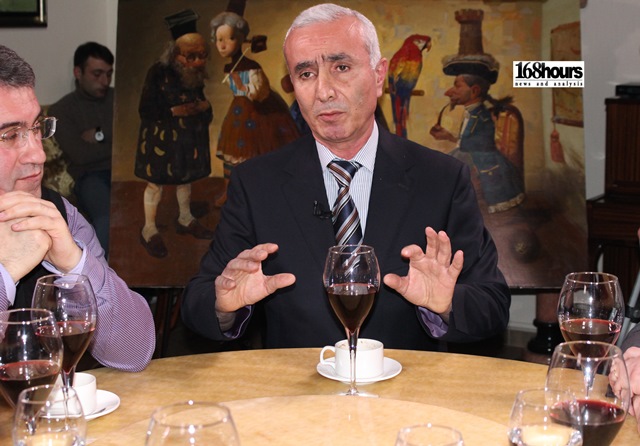
Satik Seyranyan: Does such phenomenon exist?
Armen Martirosyan: Frankly speaking, people very calmly greet me.
David Matevosyan: I’m very glad that currently in NK, which together with Armenia, is in the center of geopolitical developments, people change the Constitution, and turn semi-presidential system into strong presidential one. I’m also glad that today Ilham Aliyev appointed his wife as Vice President…If Azerbaijan were a democratic state, our situation would be much more difficult: we’re simply lucky. Our authorities have changed the Constitution for only one purpose. Moreover, ANC was against the Constitutional referendum, was completely against shift to parliamentary system, and assesses that it was only launched to prolong Serzh Sargsyan’s personal power. In all presidential elections, when I was at a certain polling station with some status, the leadership representative has lost. On the one hand, it was revenge toward presidential elections, and people should know there will be no more presidential elections in Armenia, and these elections are fatal by their importance, like presidential ones.
Samvel Farmanyan: I was a student in 1995, Mr. Matevosyan, and you probably were a part of the functioning leadership. As a student, reading the media outlets, I remember, when the Constitution was put to voting, main argument of the then political opposition was that Ter-Petrosyan adopts a Constitution by presidential system to keep his power. It’s beneficial accusing from technological perspective. Just a few months ago, when we were adopting the Constitution, our political opponents insisted that Serzh Sargsyan changes the Constitution to become NA president. Currently the president isn’t in our list, accordingly, he can’t become NA president.
David Matevosyan: Serzh Sargsyan heads your political party, he may have majority in the NA and have one deputy-PM and one deputy-NA president.
Armen Martirosyan: Why do you discuss something, to which Serzh Sargyan has publicly replied? He said: if my party is majority, I’ll remain in the leadership. Mr. Farmanyan no matter you change the law, you change the Constitution, parties can’t become larger as long as a crucial tool hasn’t been put into action: first, normal elections, second, funding of political parties.
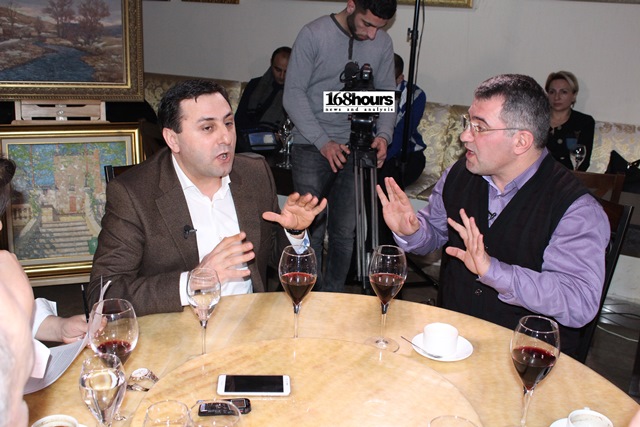
Satik Seyranyan: However, let me remind former elections, when “Heritage” didn’t have enough proxies to keep its votes.
Armen Martirosyan: Where we had, they were beating, buying the proxy, committee member, and not only of “Heritage” but others as well…Mr. Farmanyan was quite correct, the most important is existence of political will. If there is no political will, you may do the rest, which has been done—they publicly beat people, kidnapped, has anyone been punished? No. Coming to the political system: why does the leading political power pronounce the expression “political system”, when it has brought elections to the tribal level? Even in this case the proportional list, with at least 41 places is a progress, than this. This is already a district-preferential, moreover, within tribal separations.
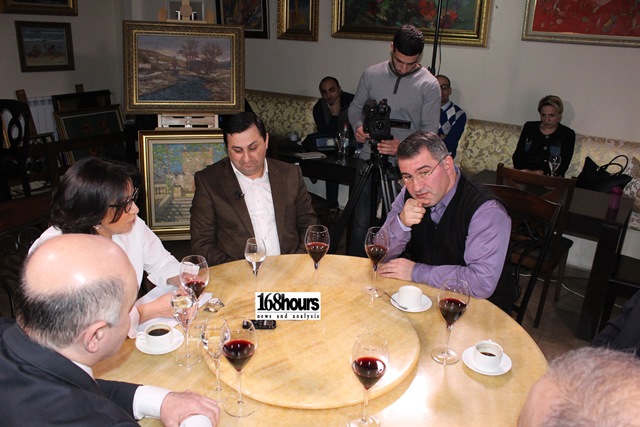
Samvel Farmanyan: Our society has long ago passed the tribal era.
Armen Martirosyan: Unfortunately, you lead to this.
Samvel Farmanyan: What prevents the leader with stable political rating, upon your formulation, take part in tribal elections and gain votes of overwhelming majority as a vivid political leader.
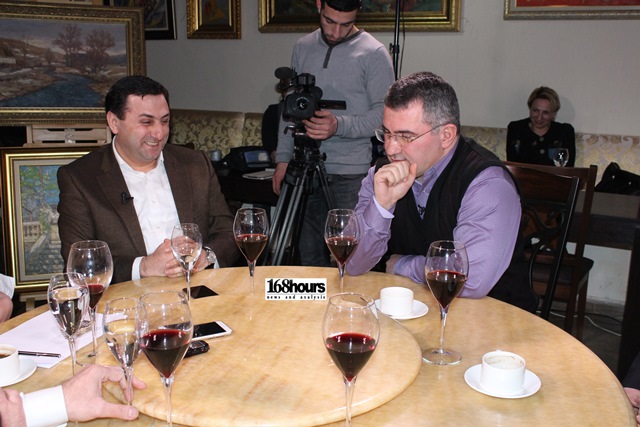
Armen Martirosyan: As, naturally, a cousin, a friend, a relative gains more votes, than the political idea.
Satik Seyranyan: Why doesn’t “Heritage” participate in elections alone?
Armen Martirosyan: “Heritage” had that percent to enter the parliament alone, however, the issue is not appearing in the parliament, but that you say—an ideology, the biggest ideology today for me are the 48 thousand migrants, which has officially been recorded last year. I don’t want that this year it exceeded 50 thousand. This is the biggest ideology for me, however, I can’t do it alone. That’s why I want cooperation with a wide alliance. Initially I said and I do insist: I was ready to cooperate with all opposition reps, and now I say, in the parliament I’ll cooperate with everyone, but the RPA. I should change the existent situation, as a few years later, when the respectable party of Mr. Farmanyan—RPA, will decide to really show political will and hold free, fair and transparent elections, that time maybe there will be no voters in the country.
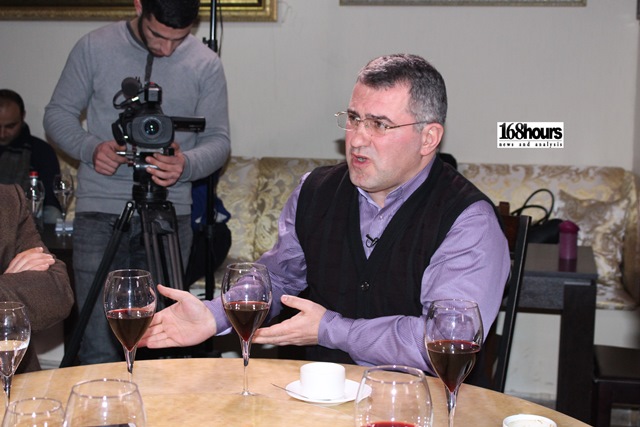
Samvel Farmanyan: There are two ways—each of us enters into our political templates of party and represents the life as it is, I think it remained in the past.
Armen Martirosyan: You mean not to notice 48 thousand migrants?
Samvel Farmanyan: I didn’t mean that. Secondly, attempting to look wider to the reality in this or that situation, also accept the part of guilt, I mean us, having no doubt that the opposition makes mistakes as well, so that it was possible to move forward for the sake of Armenia. Armen Martirosyan expressed a furthering opinion, he said we could overcome the 5% threshold alone, however, we’ve gone to consolidation to solve issues, probably meaning that in that case they may have parliamentary majority, develop the leadership, solve that 48 thousand didn’t become 50 thousand and etc. Subconsciously through our cameras Mr. Martirosyan is sending a message to voters, treating him with respect, that they should gain 50%+1, as the logic of his words was that. I assure you, that speaking to any opposition rep, they’re all sure they will gain the majority. This political rhetoric is popular. It prevents the country from moving forward.
Armen Martirosyan: The Republican with its activity party prevents that.
Samvel Farmanyan: One of RPA reps was highly respected Seyran Ohanyan, who currently comprises your alliance.
Armen Martitosyan: He wasn’t from RPA, he was the Defense Minister, non-partisan—these are different things.
Satik Seyranyan: Mr. Hakobyan, don’t you think that, however, the society doesn’t have any expectancies from any political power?
Vigen Hakobyan: Mr. Farmanyan said serious political, ideological claims shouldn’t be anticipated under the absence of the middle class. I’d agree with him, as even poverty in the country officially comprises 34%, and we all realize that official threshold is rather artificial and at least more than half is poor, in that case other systems of value emerge. If social issues are primary, we have the following situation: a big oligarch develops a party, and being a big oligarch, he moves forward by social slogans and an immense number of people will follow him. A rather contrastive situation is observed: the oligarch appears with social programs, i.e. there are other requirements among the people, rather concrete, rather pragmatic, that bar has been considerable lowered.
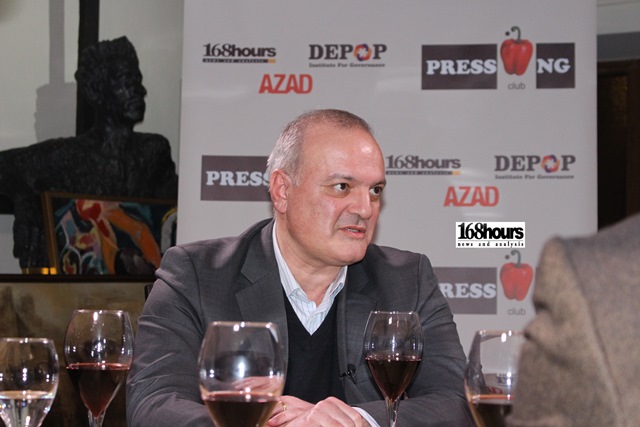
Satik Seyranyan: Thus, that bar is lower than asphalting…
Vigen Hakobyan: Yes. 1995 was mentioned, at that time I was an active opposition, and I’d say the basis dates from that period, i.e. almost these very talks were heard, there was a time when potatoes were being provided in villages and etc., currently everything has reached to another level, by cash end etc.
Armen Martirosyan: I disagree, that money always works.
Vigen Hakobyan: You’re right, currently the issue isn’t solved only by asphalting. A larger part of the society refers to elections like a holiday—“holidays are coming”…The election bribe let it be 10 thousand drams or something else, they rather seriously prepare for this. This is the fact. That’s why if we speak of ideology and etc., wider part of the society has different approaches.
Satik Seyranyan: In this period numerous populist speeches will be heard by all political powers on decrease of poverty level, jumping growth of economy, sharp rise of salaries and etc…They aren’t going to say who and how it’ll be implemented, simply promises…At least can foreign policy become a ground for serious debates?
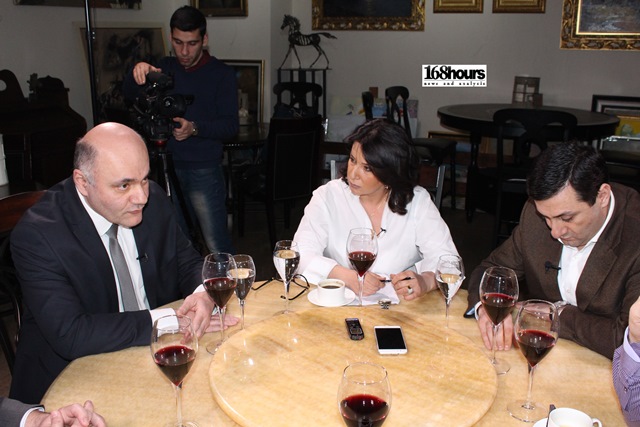
Vigen Hakobyan: Political powers, which clearly introduce their clear foreign policy orientation, will find their electorate votes. Armen Martirosyan said upon sociological polls “Heritage” could take part alone, providing its place in the NA. Perhaps, I disagree—“Heritage”, upon sociological polls I know, doesn’t pass it.
Armen Martirosyan: Upon polls it was 9.6%.
Vigen Hakobyan: I don’t argue who and how launched that poll. I publicly said—the main issue is the leader of “Heritage”.
Samvel Farmanyan: If it was 9.6%, then after April you’ll regret that you didn’t participate alone.
Vigen Hakobyan: In this regard we appeared in a rather complicated situation, when the society has different expectancies, and many political powers realize those expectancies, and out of that, even that political rhetoric is moved to the second plan. Currently we observe there are no particularly serious political debates at this very stage. I have the impression, that the opposition sector or non-leadership part initially got along with the situation, that it can’t come to power and we see, that mainly the opposition leads that fight inside its field to hold 1/3 place.
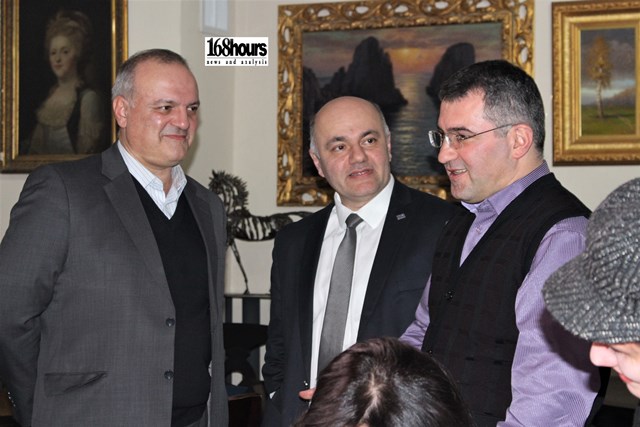
Satik Seyranyan: Mr. Shahgeldyan, what’s your goal? There are powers, which say their purpose is regime change.
Mher Shahgeldyan: In fact, any political power fights for implementation of its plans, for which it gains votes. The leverage, the tool to implement them are the authorities, they can’t be an end in themselves. From this perspective, when political powers fight for power to be capable of implementing changes through it, to change the political course, this is natural. The political power can’t fight that there was no leadership, as in that case a question arises: how are you going to implement your programs? Political powers should fight to have influence on political decision-making. If there is no such an influence, creation of policy and possibility for reforms lack either. This is a global issue for everyone. Yes, a political power wants to gather votes either to influence on decision-making, or accept those decisions for itself. Like any political power, “Armenian Renaissance” today fights for gaining maximum votes, or have a real impact.
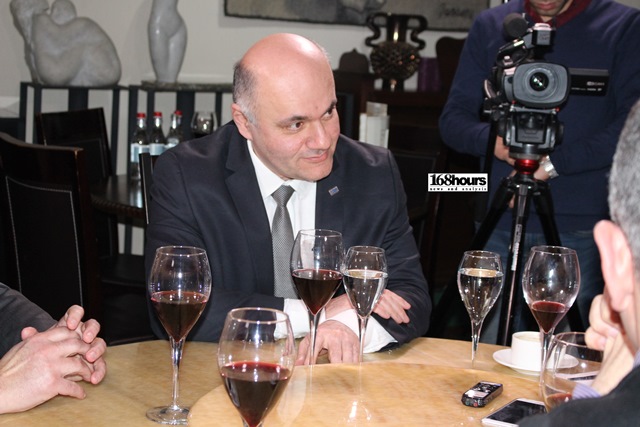
Samvel Farmanyan: I agree with Mrs. Seyranyan’s observation on public opinion regarding distrust.
Satik Seyranyan: It also refers to RPA—the leading political power.
Samvel Farmanyan: Of course, it refers to the authorities as well. If political leadership should rejoice by the circumstance that the society has distrust toward the political system, thus, that person should be a bit insane, as from sociological perspective it’s simply an unexploded bomb. Currently, yes, the society has distrust toward political powers. I have the impression that we, as the leadership, are more tended to record this truth and attempt to think over medicament, than the political opposition. When the society sees no alternative, we should realize, that it’s not only toward political opposition. There will be no one, able to convince me that if any citizen believes in any political power, he/she considers that he/she should follow and vote for it, any pressure, fear, any bribe has the power to have an effect on political behavior of a person. Due to the reason you mentioned—poverty, social issues, objective distrust toward the authorities is added to distrust toward the opposition, as a result of which apolitical radical manifestations are born.
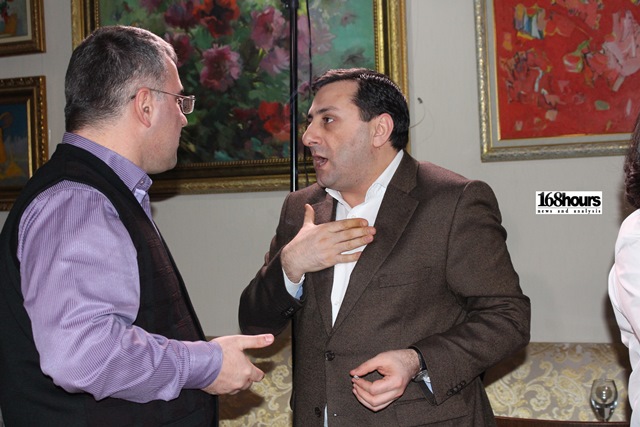
Mr. Martirosyan used a rather interesting expression—“tribal society”. You mean that most part of candidates, nominated by preferential voting, aren’t distinguished with their political readiness, they aren’t pioneers of political mind. All political powers, not only from the position of the leadership, but from the opposition as well, literally initiated hunt for months toward, as Mr. Martirosyan said, “tribal” political actors. I may name one candidate from each political party present here, who, as Mr. Martirosyan said, belong to the genre of those “tribal” relations.
Armen Martirosyan: Go ahead.
Samvel Farmanyan: You have Hayk Khachatryan in your list. Can you insist that he is a titan of political mind?
Armen Martirosyan: Absolutely no.
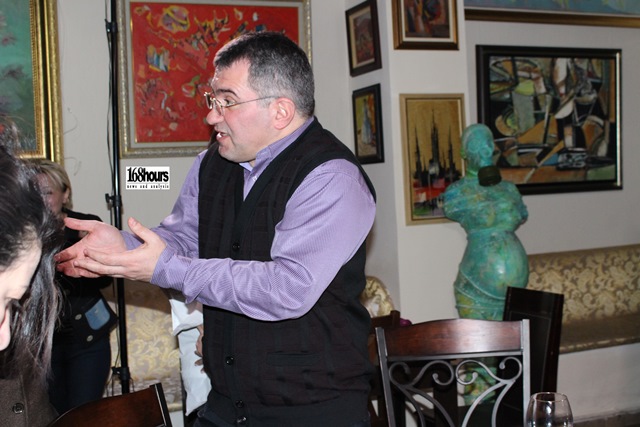
Samvel Farmanyan: So…If you mean that people producing political mind in political life don’t dictate or dictate the political agenda insufficiently, this is a health diagnosis subject to treatment, but, please, don’t address accusations to us only as in ANC-PPA alliance there is Hakob Hakobyan’s (Ledi Hakob) example, in “Armenian Renaissance” Arkadi Peleshyan’s example, and etc.
David Matevosyan: Hakob Hakobyan stood on the tribune, and was arrested on “the case of 7”.
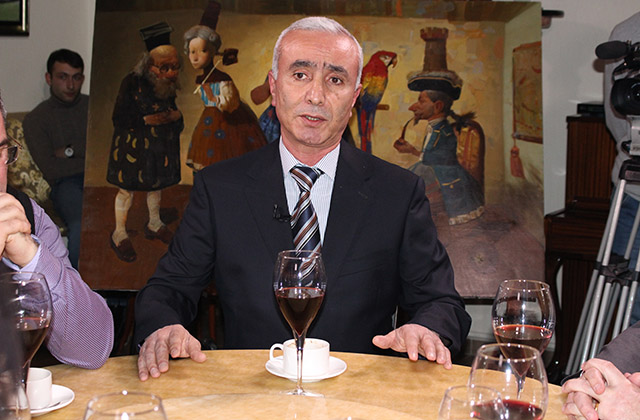
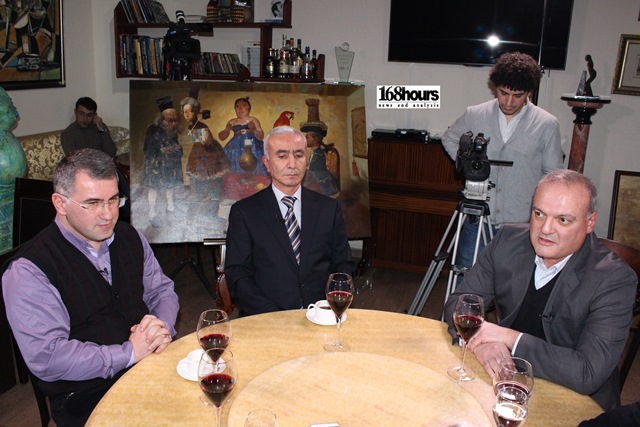
Samvel Farmanyan: What prevented Raffi Hovhannisyan, as a person with nationwide recognition, nominate in concrete Yerevan district, pass on your messages and record crushing victory over your mentioned tribal, odious figures, record through proxies and prove that it’s possible.
Armen Martirosyan: Raffi Hovhannisyan was nominated, he recorded crushing victory over Serzh Sargsyan, but that victory you seized with fraud. Raffi Hovhanisyan doesn’t have anything to prove.
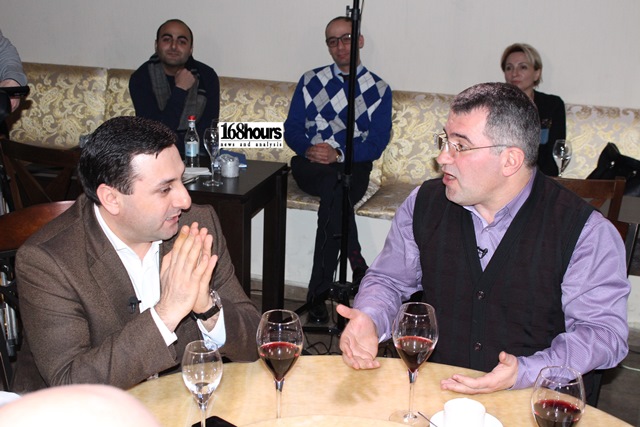
David Matevosyan: It refers to the point that the society trusts neither the authorities, nor the opposition. It’s rather natural. Generally people have natural demand for prosperous and peaceful living. In our country there is neither peace, nor prosperity. The authorities, capable of establishing these two, are worth respect. Even the incumbent authorities strive to provide prosperity through certain programs. I only need to enumerate them: suppose, construction of a new atomic power plant, North-South unfinished road, joint energy with Iran on Araks River, oil-processing plant, railway. This is from Serzh Sargsyan’s pre-election plan.
All that fails, as we are a country waging a war. We are sure, as long as peace hasn’t been established, it won’t be possible to establish a prosperous life. That’s why our people go to that. I should cite a very bad index, which will make us all think over—in the school year 1997-98 number of pupils in Armenia’s schools comprised 592 thousand, now that number is 300 thousand, moreover, currently 12-year school system has been established. Thus, we appeared in a situation, that we should think over solving our number one issue—establishing peace. I’m sure even with proper organization by the weapons of 1980s we can protect the borders so that there won’t be a necessity to fight with submachine gun. However, suppose, we recorded success in another war. What will be then, under the conditions of deepening hostility? What will be the number of our children?
Satik Seyranyan: I consider, during this campaign even the leading political power—RPA, will appear from opposition positions, there is an impression that everybody is opposition. The citizen will be lost. My question to representatives of all powers: why should people elect you, and not—other political powers? The authorities—RPA, why should the citizen re-elect you?
Samvel Farmanyan: The issue is as follows: which political power and under which circumstances may come to the settlement of these issues? I may record that the leading political power, also by lessons learned, currently appears with a more prepared team from the perspective of assuming responsibility, also with deep realization regarding why they shouldn’t proceed the way, we move in many directions. As a voter, I’d look to one index only—are there enough people in the list of that political power capable of assuming the responsibility of state leadership with all its branches? Frankly speaking, judging from the lists of other political powers, unfortunately, I don’t see any alternative. If a political power wins, it should assume responsibility from country’s first figure, the PM up to other possible positions.
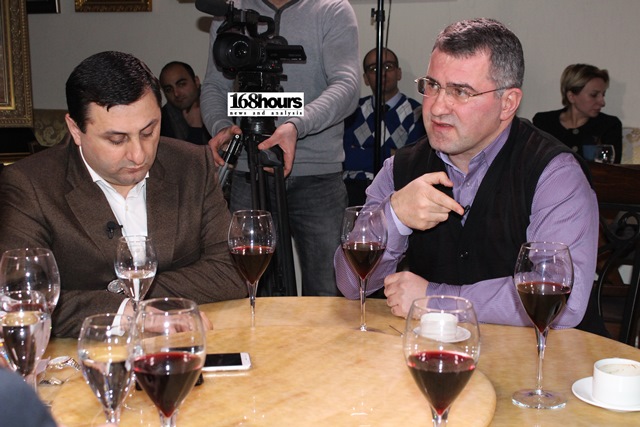
David Matevosyan: The PM and his team are one-moth party members. It contradicts to what you said. You say people will see that these people are in our team…You bring them, make a party member, those people weren’t born from your team.
Satik Seyranyan: Mr. Martirosyan, why should people vote for Ohanyan-Raffi-Oskanian alliance?
Armen Martirosyan: Our only target is RPA. No matter the society has certain reservations from opposition powers, when the day comes, it at least choses the principle of lesser of two evils.
Satik Seyranyan: Is your alliance the lesser of the two evils?
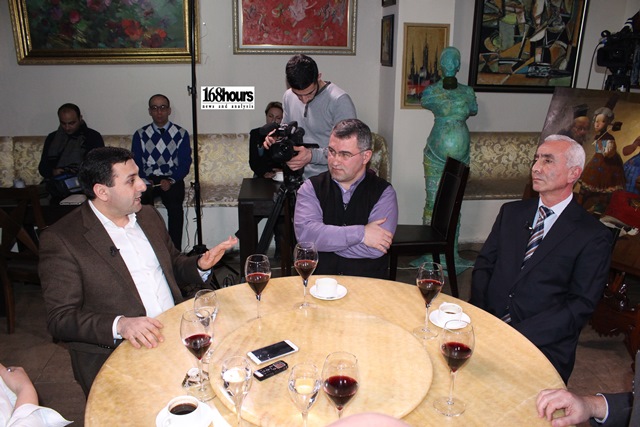
Armen Martirosyan: RPA’s contestant today isn’t Ohanyan-Raffi-Oskanian alliance, or ANC or others, but its main contestant is people. When Pinochet came to power, he was the only decision-maker, however, he provided that freedom to 11 Chicago boys and those boys implemented those Chili reforms. Their list included neither 150, nor 600 persons. Those 11 were making decision with Pinochet’s leadership, and they implemented those changes. In our case a small team to implement those changes exists, and the big team we see in the Diaspora and the social field. Raffi Hovhannisyan, Seyran Ohanyan, Vartan Oskanian are state figures with experience, big professional knowledge, and what is the most important—they have the political will to implement reforms. We are coming to bring those changes into life, and as experience, political will, knowledge is available, we can implement it. Even if we have overwhelming majority, we should cooperate with other opposition powers, as in this case not only legitimate authorities, but also inner-Armenian solidarity.
Satik Seyranyan: Seyran Ohanyan has never cast doubt on legitimacy of incumbent authorities.
Armen Martirosyan: And this is good. Do you imagine the Defense Minister casts doubt on it, and e.g. and commands a detachment to take the authorities? It was perfect that he was neutral until the end. It should be assessed.
Satik Seyranyan: If he disagreed with the pursued policy, he could resign.
Samvel Farmanyan: Please, don’t protect Seyran Ohanyan from us, as he has been our Defense Minister for 10 years and he was highly respected. Say things to sound convincing, you say: he maintained political neutrality. Your leader Raffi Hovhannisyan from Freedom Square was blaming him in this.
Armen Martirosyan: Serzh Sargsyan also cooperates with Artashes Geghamyan, when they mutually offended each other. You make half sentence a cliché and continue circulating with codes in the media outlets.
Satik Seyranyan: Do you want the media outlets, political figures and the society have memory loss?
Armen Martirosyan: Just a few months ago you considered Seyran Ohanyan a national hero—the media outlets, the opposition, the authorities. Everybody remembers it. People gave personal offenses, now they make an alliance, but you miss a sentence…
Satik Seyranyan: Isn’t Serzh Sargsyan—Artashes Geghamyan cooperation or Serzh Sargsyan—Artur Baghdasaryan cooperation being touched upon?
Armen Martirosyan: I won’t go into details.
David Matevosyan: Firstly, let me touch upon what Mr. Farmanyan said. Through the efforts of prominent persons of your list currently Armenia’s state debt comprises USD 5 billion, external debt—USD 5 billion. Out of law provision I gave my consent to be involved in the list. Why? I have the intention to become neither and MP, nor a leadership rep, but I want that my children and their generations in Armenia saw a perspective and didn’t migrate. I’m deeply convinced that without establishment of peace I’ll be impossible to record. The proof is the figures I brought. People will decide for themselves to give or not, and if yes, ANC will have influential presence in the NA, it’ll mean that there is social demand to establish peace. I’m not interested in who will the leadership be and who—the opposition, however, I’m sure those powers will take people’s opinion into consideration.
Mher Shahgeldyan: Our party leader—Artur Baghdasaryan, is a person with big political experience, who worked for the country, has big intellectual potential, who not only as a political figure, but also as a person, has done a lot for the country. The second issue is the proposals we have, we submit today, and those proposals are several. We understand imperative of country’s development and we consider industrial enterprises should work, and workplaces should be established. Currently we have about 10 military-industrial enterprises, which can operate. After the developments in Ukraine we were CSTO member and were getting involved in EEU, Russia was bringing back its military orders from Ukraine and a part of those orders could come to Armenia, it was only necessary to undertake the process of launching those enterprises. When Artur Baghdasaryan was National Security Council Secretary there were proposals, and there was agreement on technological modernization with Russians, and these orders could come. The market was existent, it was the market of CSTO and EEU. This is one of the examples, which we know what we do and we propose. The second reform we propose is that 18 year young men didn’t stand on border.
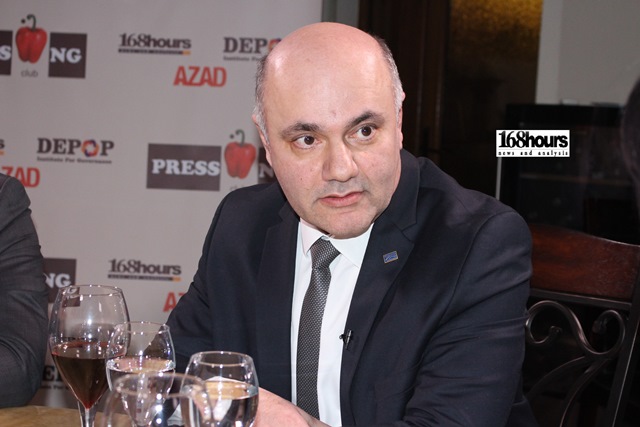
Satik Sargsyan: It was the proposal of Aram Zaven Sargsyan.
Mher Shahgeldyan: It’s possible, currently we’re introducing it. A 18 year-old, who isn’t so prepared to stand on the frontline, should be replaced with professionals, specialists. Armenia’s economic, social, as well as demography condition weakening decreases our possibilities of peace maintenance. We realize that, yes, peace is necessary, however, to maintain it’s necessary to have powerful, strong Armenia, and this, I think, is an issue of a few months.
Satik Seyranyan: Mr. Hakobyan, finally what kind of a parliament are we going to have?
Vigen Hakobyan: I have the impression, about 6 political powers will pass to the Parliament, RPA and “Tsarukyan” alliance, other political powers will turn around the transient threshold. The authorities aren’t concerned less than the opposition to create more or less comfort conditions in the parliament, in particular, in the segment considered opposition. I think the authorities would like to be that mosaic segment to provide its games, to control it, so that there were political figures in the opposition segment, who will pass on big political appearance to the parliament. Also I consider the authorities will attempt to maintain tolerance from geopolitical perspective as well. Naturally, the authorities will attempt to develop stabile majority, will have hopes with ARF, of course, there are issues linked to the transient threshold, however, this preferential system allows to somewhat maneuver in the field.
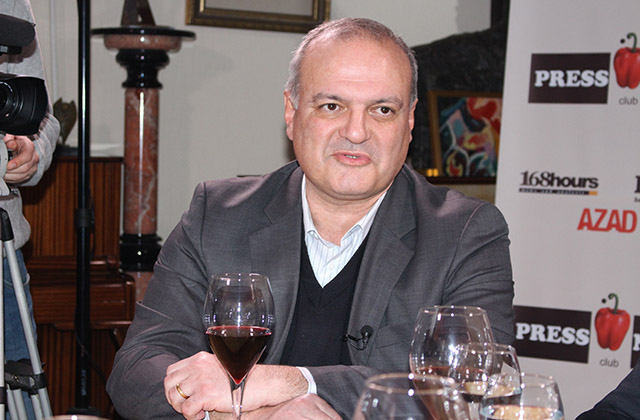

Satik Seyranyan: Are post-election developments, street fight and etc. possible or all the powers will be satisfied?
Vigen Hakobyan: Generally the one initiating post-election developments is the second power. For the time being “Tsarukyan” alliance pretends for the second power, and Tsarukyan has repeatedly stated that he is against new developments: he isn’t the one he used to be in February 2015, he is against changes, he doesn’t use the expression “regime change” at all. At the moment it’s difficult to observe that such developments will occur, resources are necessary to that end. Of course, if other powers, despite being the second or the third, decide to consolidate and attempt to introduce Tsarukyan into the game as well, this is a theoretical option.
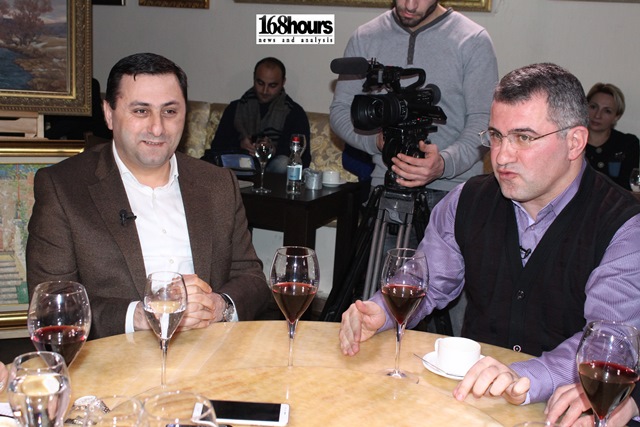
Satik Seyranyan: Is it possible that role may be assumed by Ohanyan-Raffi-Oskanian alliance?
Vigen Hakobyan: Generally it may undertake, however, for the time being such perspective is becoming rather problematic, as I consider in non-leadership field, however, there is distrust toward one another. The issue of some non-leadership powers in these elections will being capable of convincing the society that they aren’t customers.
Ani Keshishyan
Razmik Martirosyan
Photos—“168 Hours”
“Pressing” Club is implemented in partnership with “DEPOP” Institute for Governance and “Azad Pharma AG” Swiss Company









